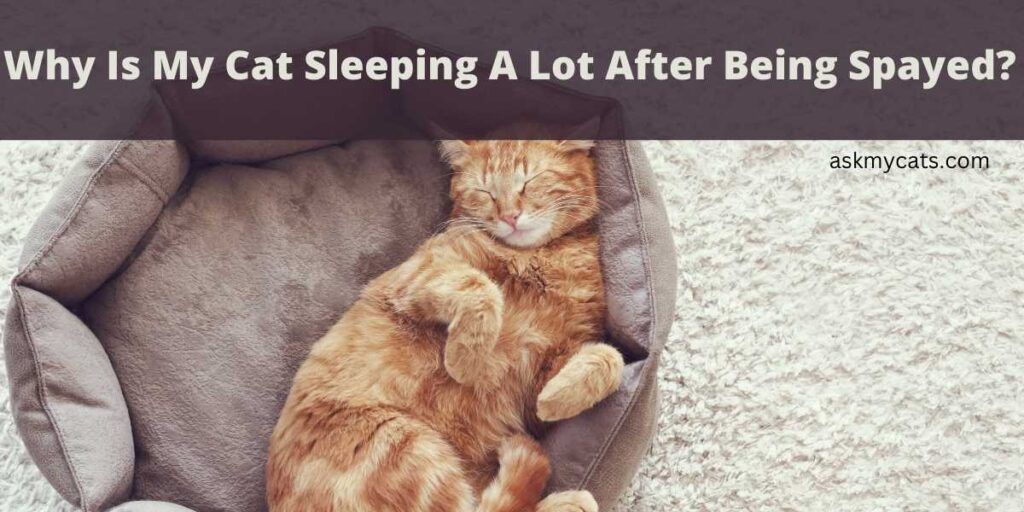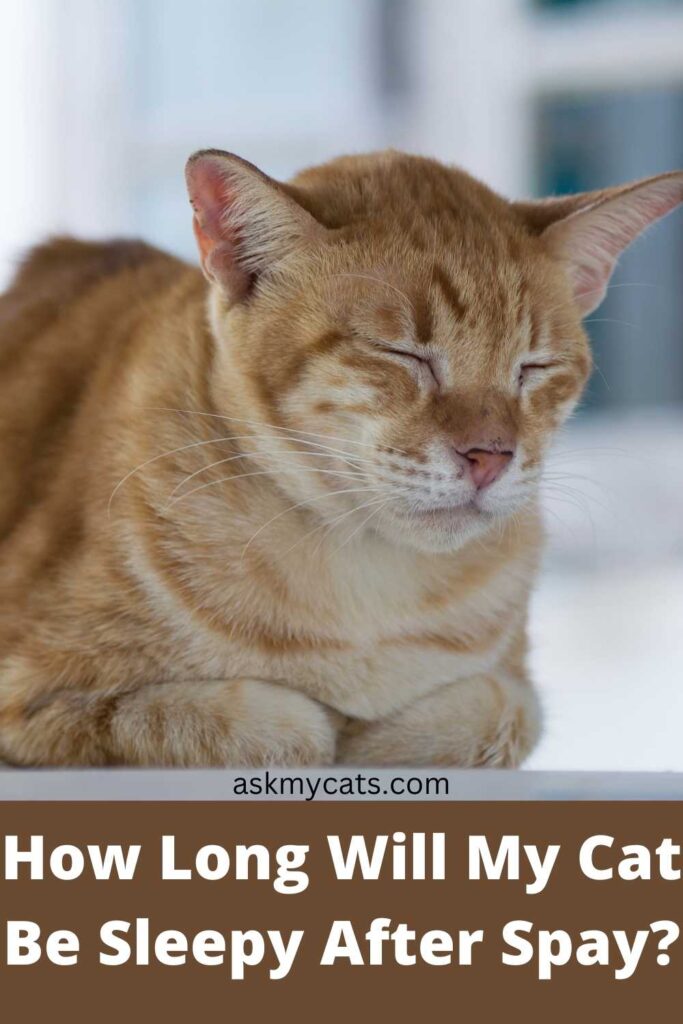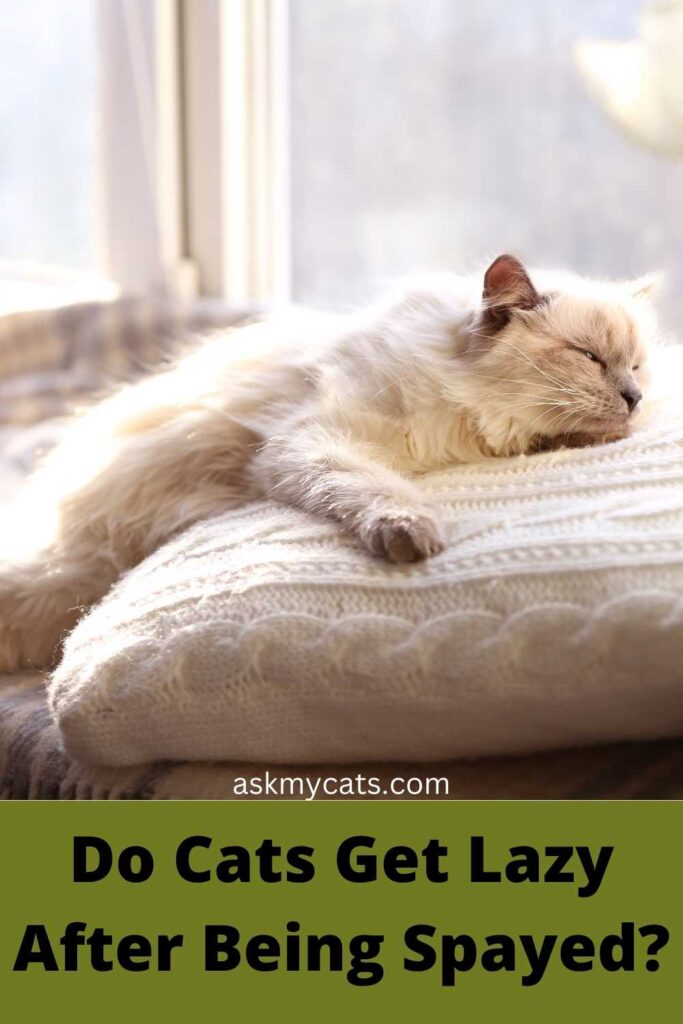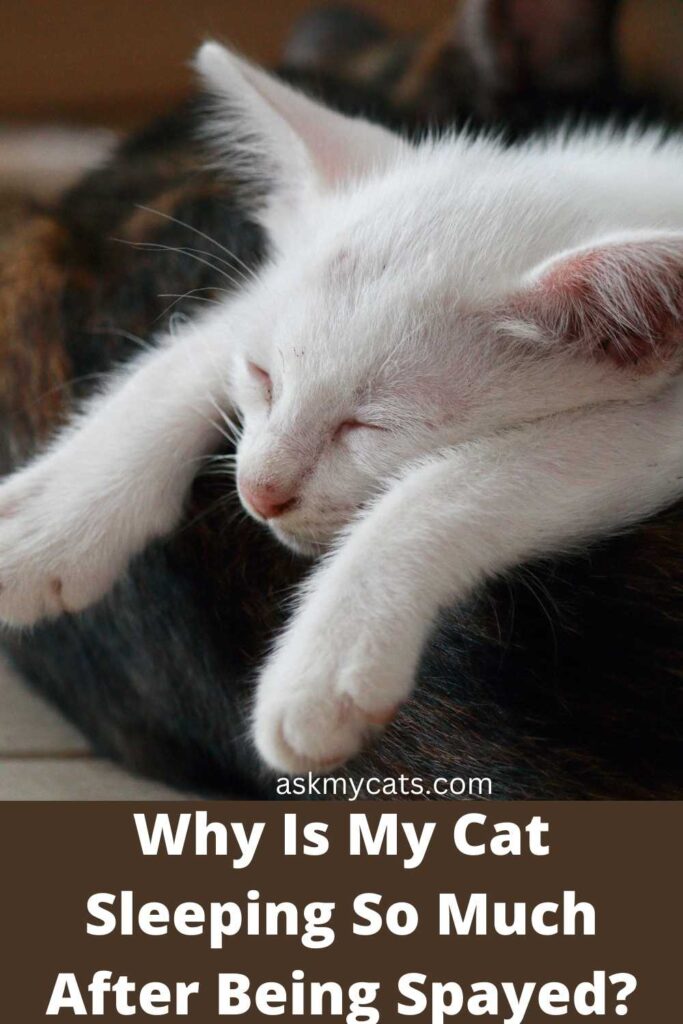If you got your furbaby spotted recently, you’ll notice a change in her sleeping habits after spaying. While this may seem concerning, there really isn’t much to worry about.
There is a logical explanation behind her feelings like this, and we will talk about it in this write-up.
In this article, you’ll get to know if it is normal for a cat to sleep a lot after surgery and the reasons behind it so that you don’t feel worried.
Let’s get into it.


Give Your Cat the Perfect Day
Get the Free Ebook!
Is It Normal For A Cat To Sleep A Lot After Surgery?
Yes, it is absolutely normal for your cat to feel dizzy or even very sleepy after her spaying procedure is over.
Your pet will be unconscious throughout the procedure because spaying is done under a general anesthetic. Your female cat will have a tiny incision made in the abdomen wall, and get her uterus and ovaries removed as a part of the procedure.
Your pet may appear sleepy and sleep a lot in the first 24 hours following surgery, which is quite normal.
Keep your distance and avoid handling your cat unless absolutely essential, as the effects of the anesthetic may lead him to act aggressively or irritated. Make sure your cat is cozy and secure by keeping her in a crate or small space to sleep.
The spaying of cats is a common procedure performed by veterinarians, animal shelters, and animal hospitals around the world.
Although spaying is typically a safe procedure, it is physically demanding and somewhat invasive for your cat. After surgery, it could take many days for your pet to act like herself again.
A Normal Reaction
When you first bring your cat home, you can anticipate her passing out for a few hours on the closest soft surface.
Due to the residual anesthesia and physical weariness following the procedure, she will be quite exhausted for at least 24 hours. Therefore, she will sleep for the majority of this time.
She will also need to get used to not producing the hormones that her uterus and ovaries did before they were removed.
Even though some cats are willing to eat the day of the procedure, you shouldn’t anticipate your cat being hungry until the following day.
Know the reasons for Cat Lethargic After Spaying
How Long Will My Cat Be Sleepy After Spay?

Expect your cat to be a bit unsteady and sleepy for the next 12-24 hours after the surgery.
Under a full general anesthetic, spaying is done. The anesthetic is injected into a foreleg vein following a pre-med injection that also contains a numbing pain reliever.
During this time:
- She should be allowed to relax quietly at this time in a warm, cozy location that’s not too hot.
- Offer her a small supper; but, if she doesn’t feel like eating when she comes home, don’t panic; her normal appetite should return within 24-48 hours. Make sure there is always access to fresh, clean water.
- After the procedure, she should be kept inside for at least two days, preferably longer, to allow the wound to start healing.
- If you just received an adult cat, you might need to keep her in for a little longer after the procedure so she can get used to living with you. Spaying a stray cat won’t stop it from going missing again.
- Please call the post-operative care center if your cat hasn’t eaten within 24 hours following the procedure, she’s acting listless, or you have any other worries about the wound or her well-being.
The little skin incision is sutured and stitched after the procedure. These sutures are typically invisible since they are buried beneath the skin and are dissolvable. The nylon stitches used by veterinarians occasionally need to be removed.
We will schedule a visit to check on your cat again in 2-4 days or to have any nylon stitches removed in 10 days when you pick her up.
Please be careful that your cat doesn’t obstruct any stitches that are already in place; if necessary, a collar can be provided to do so.
Must Read: Why Is My Spayed Cat Pulling Out Her Stitches?
Do Cats Get Lazy After Being Spayed?

No, cats are not supposed to behave inactively after being spayed. Being lazy is not a common symptom of being spayed.
Your female cat’s uterus and ovaries should be removed to lower its risk of uterine infections and ovarian or mammary cancer.
While your cat is out exploring, you can also help prevent any injuries from cat fights with stray cats. Instead of looking for a partner on the streets, they will probably stay at home or nearby.
Although spaying and neutering are essential parts of pet care, they are not the only medical costs your pet is likely to face.
Expectant Behavior
The behavior of your cat is the most noticeable difference. Due to the residual anesthetic, your cat will probably curl up and sleep when you first bring her home from the procedure. She might also move more cautiously and be less fun as she heals because of pain at the incision site.
You could discover that your cat’s hormones take some time to normalize after the initial recuperation because of how her body is adjusting.
Her hormonally driven behavior might not change until this occurs. She won’t have heat or screech all night long in quest of a mate after she has fully healed.
Instead, spending time snuggled up on the couch will make her feel more at ease and content. Spayed cats may be more prone to obesity as a result of this lethargy.
Depending on their activity levels, you can adjust their diet and the amount of food they consume to help prevent this.
But not every aspect of her personality will change as a result of the surgery. She won’t be driven by hormones any longer, but she’ll still be as lovable and playful as she was when she was whole.
Interesting Read: How Long After Spay Can Cat Play?
Why Is My Cat Sleeping So Much After Being Spayed?

The only reason your feline feels so sleepy after being spayed is because of the aftereffects of anesthesia.
Almost all female cats that have been spayed endure some side effects. Your cat will need to be put to sleep by the vet before having several inches of her abdomen cut out.
You may imagine how bizarre your cat feels when she awakens following the procedure, as both the uterus and the ovaries are removed.
The vet will want you to come in for a follow-up appointment during the next two weeks after the wound is sutured shut.
During the 7–10 day healing period, it’s crucial to keep your cat from biting or licking the incision. Lick guards and collars are available for this purpose.
For ten days, avoid any intense exercise at all, confine your cat to your home, and avoid all baths and grooming. Your cat will be fully recovered at the end of that time!
Special Diet
All cats need food that is nutritionally balanced, but because your cat’s demands will alter while she is recovering, her regular diet could not give her the exact combination of nutrients she needs. She might also require encouragement to eat.
For a cat recovering from sickness, injury, surgery, or a spell without food, proper nutrition is extremely crucial. Her wounds won’t heal correctly without it, and they could get infected.
Additionally, if she is eating adequately, her body won’t turn to her own vital tissues for energy.
During her rehabilitation, you may find that your cat has lost some of her appetites. A high-fat diet may be beneficial. Higher fat foods are “concentrated” so that your cat can consume fewer of them while still getting the higher levels of energy and nutrients she needs.
To prevent the body from being deficient in essential nutrients, diets intended for convalescence must also contain the proper ratio of minerals and vitamins.
Your veterinarian could suggest a special food for your cat that meets all of her nutritional needs in a concentrated form because recovering animals may eat very little.
Must Read: How To Tell If My Cat Is In Pain After Spay?
Frequently Asked Questions
What are the problematic symptoms in a cat after being spayed?
Lethargy and a lack of appetite in your cat are frightening, but you shouldn’t start worrying until the behavior lasts for several days. If your cat continues to refuse food 36 hours after being released, there might be an issue. After 24 hours, her energy levels ought to be back to normal, if not exactly normal.
You should call your veterinarian and explain the situation to him if she is still sleeping significantly more than usual and appears reluctant to move. Although spaying is a routine and safe procedure, there is a chance of problems or infection, so it’s crucial to take your cat back to the vet if her condition does not get better within a day.
Final Words
That’s all you had to know about spayed cats and their post-operative laziness.
Let us know in the comments section if your cat has displayed such behavior. What did you do to help her get back to her normal timetable?
